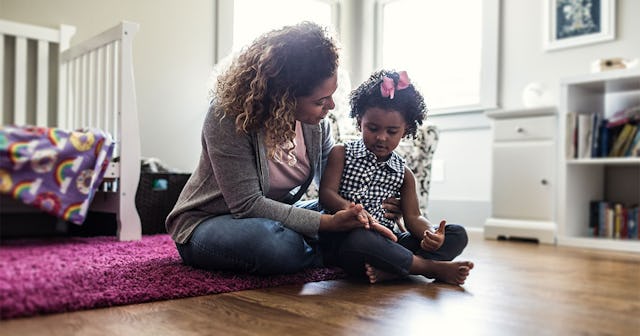A Psychologist Explains How To Talk To Kids About Coronavirus

If you don’t know how to talk to your kids about coronavirus, let an expert help
What’s happening right now all over the world is not normal. It’s not something any of us have ever experienced in our lifetimes. Coronavirus spread and the subsequent “social distancing” to slow it is uncharted territory for literally everyone. For parents, it means struggling to explain what’s happening to our kids and helping them adjust to an abrupt end to school, no more playdates, possible financial insecurity due to job loss, and no firm end in sight for any of it.
Thankfully, there are experts we can call on during this unprecedented period in history, and one of them is Dr. Eileen Kennedy-Moore, an author, speaker, and private practice psychologist. She has some great suggestions (and comforting words) for those of us grappling with the best way to talk to kids about coronavirus. She first tells Scary Mommy what not to do.
“Don’t tell the kids up-to-the minute numbers on how many people are sick. That’s really, really scary. Even as adults we don’t need to be checking that constantly,” she says. But if kids are asking questions, what can we do?
Dr. Kennedy-Moore says it’s really up to each individual child when it comes to how much information to share. “The best policy with most difficult situations and with kids is to follow their lead. Kids know how much information they can tolerate. So if they’re asking questions, answer them as briefly and factually as your can. If they’re not interested, let it go.”
Just like as parents need to know what’s going on with this ever-changing situation, kids who are curious about it should also be told what’s up — but just the facts. “Kids also need factual information about things that affect them, things that will change their lives,” she explains. It’s hard to gloss over it entirely because their whole world has changed — and very rapidly. Suddenly, they’re not at school anymore, they’re not at their instrument lessons or sports practices, they aren’t hanging out with friends or neighbors. And life at home is wholly different too, which is something else that requires explanation.
When it comes to cluing kids in on why their parents are no longer heading into the office, simple is best. Dr. Kennedy-Moore suggests focusing on the positive rather than alarming statistics or scary outcomes. “You can tell them, ‘Mommy’s working at home now so that we can keep everyone safe from the virus,'” she says.
Reminding kids of the immediate, comforting facts can go a long way in reassuring them. “You can tell them ‘Right here, right now, we are all healthy’ and you can talk about the things you are doing to stay healthy,” she suggests. “You can also talk about how this is a community thing, that we are all working together to keep people safe.”
But sometimes, kids aren’t looking for clear answers — they just need to know that their confusing feelings are being heard. “Acknowledge their real feelings,” Dr. Kennedy-Moore urges. She says it’s good to guide them through that conversation. “Tell them, ‘You’re feeling ____ because ____, or, “It bothers you when ____. It’s hard for you when _____. You wish _____. Just describing the child’s feelings and kind of wrapping them up in words can help,” she says.
It can be hard for a parent to ignore that instinct to make it all better, and during this unprecedented time, we can’t even really make that promise. Instead, Dr. Kennedy-Moore reminds parents that we, “don’t have to rush in and fix the feelings, just acknowledge them and that may be enough.”
“Adults tend to want to skip the feelings and find the solution,” she says. “Don’t move on to problem-solving until you find them softening those feelings.”
Being honest about our own anxiety can also be helpful. “Acknowledge that it’s hard not knowing for us,” she says.
In case it’s the adults that need a little reassurance, Dr. Kennedy-Moore has that covered too. “We have to embrace courage and faith,” she tells us. “Even getting out of bed in the morning is an act of courage because we don’t know what’s going to happen that day. We have to just tolerate that uncertainty. Faith, because we believe there’s more good than bad and we’ll get through the hard times with the help of people who love us.”
As far as tips to make an unknown period of quarantine more bearable? It’s all about movement and ditching those four walls for at least a little bit every day. “Getting outside if we can is crucial, every single day,” she says. “Getting some exercise is so important.”
That goes for the kids too. Dr. Kennedy-Moore also emphasizes the importances of social contact, especially for teens. Those iPads and phones will be an important lifeline while we’re all staying away from each other.
In the end, it’s all about being creative, she says. We need to do what we can to connect during this time of social distancing so that all of us — kids included — can get through this challenging time with as little anxiety as possible.
This article was originally published on